Ethics Application Form for Undergraduate Students at Roehampton Business School
VerifiedAdded on 2023/01/19
|18
|4280
|66
AI Summary
This document is the Ethics Application Form for Undergraduate Students at Roehampton Business School. It is a vehicle to ensure that students have considered the ethical implications of their research and can communicate them clearly. The form includes personal details, supervisor approval, project details, methodology outline, ethics issues, health and safety issues, research involving participants, and data protection.
Contribute Materials
Your contribution can guide someone’s learning journey. Share your
documents today.
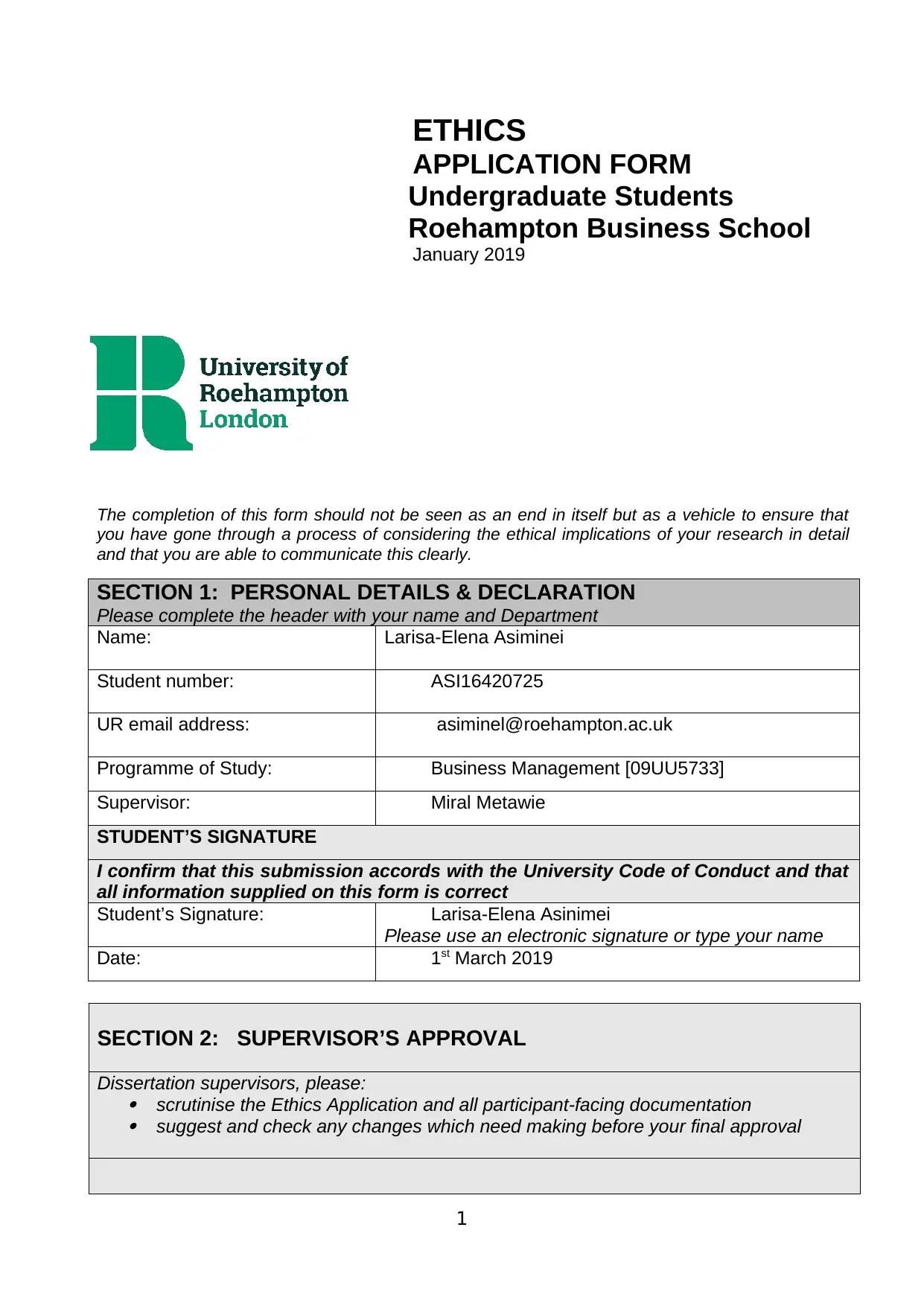
ETHICS
APPLICATION FORM
Undergraduate Students
Roehampton Business School
January 2019
The completion of this form should not be seen as an end in itself but as a vehicle to ensure that
you have gone through a process of considering the ethical implications of your research in detail
and that you are able to communicate this clearly.
SECTION 1: PERSONAL DETAILS & DECLARATION
Please complete the header with your name and Department
Name: Larisa-Elena Asiminei
Student number: ASI16420725
UR email address: asiminel@roehampton.ac.uk
Programme of Study: Business Management [09UU5733]
Supervisor: Miral Metawie
STUDENT’S SIGNATURE
I confirm that this submission accords with the University Code of Conduct and that
all information supplied on this form is correct
Student’s Signature: Larisa-Elena Asinimei
Please use an electronic signature or type your name
Date: 1st March 2019
SECTION 2: SUPERVISOR’S APPROVAL
Dissertation supervisors, please:
scrutinise the Ethics Application and all participant-facing documentation
suggest and check any changes which need making before your final approval
1
APPLICATION FORM
Undergraduate Students
Roehampton Business School
January 2019
The completion of this form should not be seen as an end in itself but as a vehicle to ensure that
you have gone through a process of considering the ethical implications of your research in detail
and that you are able to communicate this clearly.
SECTION 1: PERSONAL DETAILS & DECLARATION
Please complete the header with your name and Department
Name: Larisa-Elena Asiminei
Student number: ASI16420725
UR email address: asiminel@roehampton.ac.uk
Programme of Study: Business Management [09UU5733]
Supervisor: Miral Metawie
STUDENT’S SIGNATURE
I confirm that this submission accords with the University Code of Conduct and that
all information supplied on this form is correct
Student’s Signature: Larisa-Elena Asinimei
Please use an electronic signature or type your name
Date: 1st March 2019
SECTION 2: SUPERVISOR’S APPROVAL
Dissertation supervisors, please:
scrutinise the Ethics Application and all participant-facing documentation
suggest and check any changes which need making before your final approval
1
Secure Best Marks with AI Grader
Need help grading? Try our AI Grader for instant feedback on your assignments.
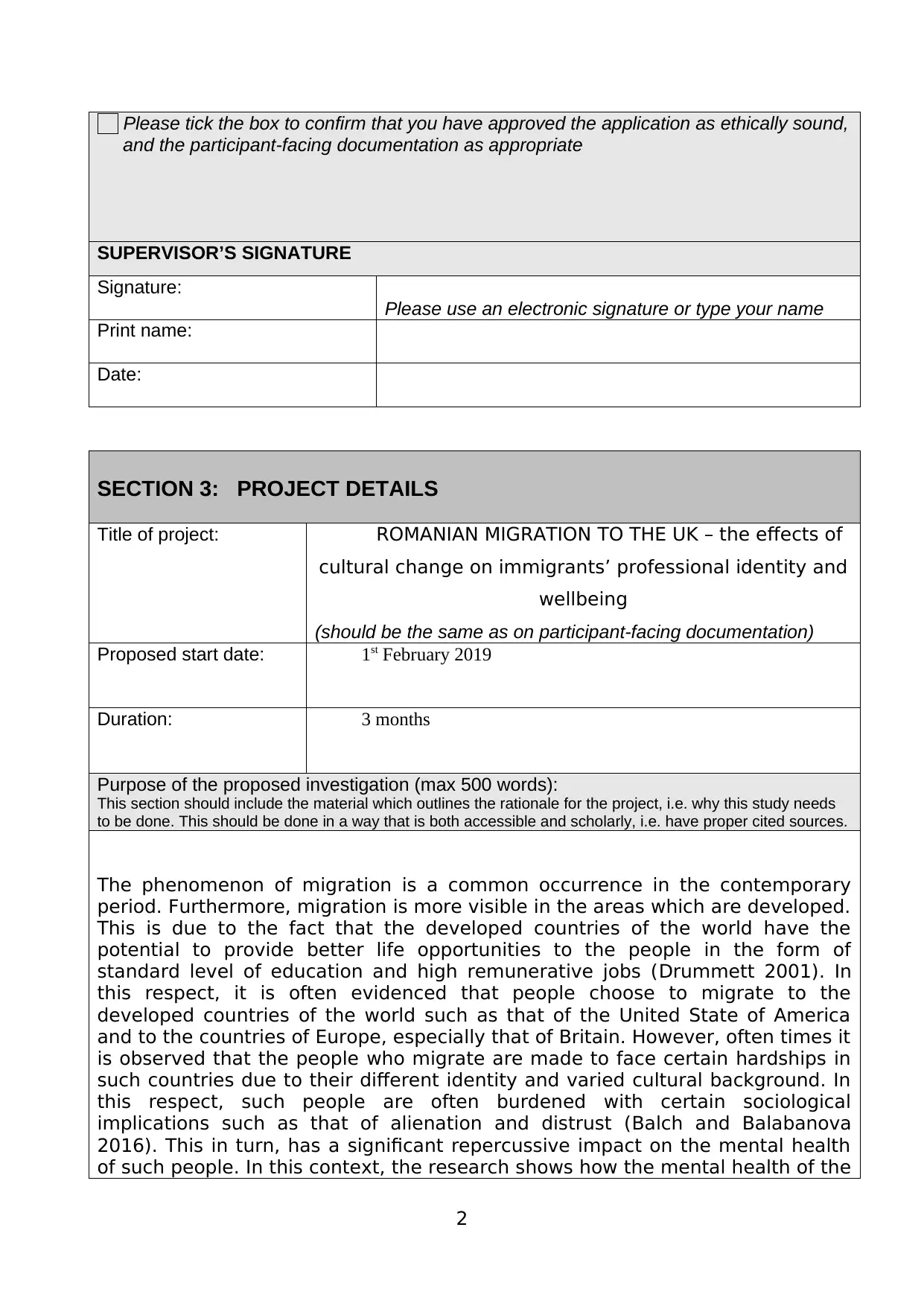
Please tick the box to confirm that you have approved the application as ethically sound,
and the participant-facing documentation as appropriate
SUPERVISOR’S SIGNATURE
Signature:
Please use an electronic signature or type your name
Print name:
Date:
SECTION 3: PROJECT DETAILS
Title of project: ROMANIAN MIGRATION TO THE UK – the effects of
cultural change on immigrants’ professional identity and
wellbeing
(should be the same as on participant-facing documentation)
Proposed start date: 1st February 2019
Duration: 3 months
Purpose of the proposed investigation (max 500 words):
This section should include the material which outlines the rationale for the project, i.e. why this study needs
to be done. This should be done in a way that is both accessible and scholarly, i.e. have proper cited sources.
The phenomenon of migration is a common occurrence in the contemporary
period. Furthermore, migration is more visible in the areas which are developed.
This is due to the fact that the developed countries of the world have the
potential to provide better life opportunities to the people in the form of
standard level of education and high remunerative jobs (Drummett 2001). In
this respect, it is often evidenced that people choose to migrate to the
developed countries of the world such as that of the United State of America
and to the countries of Europe, especially that of Britain. However, often times it
is observed that the people who migrate are made to face certain hardships in
such countries due to their different identity and varied cultural background. In
this respect, such people are often burdened with certain sociological
implications such as that of alienation and distrust (Balch and Balabanova
2016). This in turn, has a significant repercussive impact on the mental health
of such people. In this context, the research shows how the mental health of the
2
and the participant-facing documentation as appropriate
SUPERVISOR’S SIGNATURE
Signature:
Please use an electronic signature or type your name
Print name:
Date:
SECTION 3: PROJECT DETAILS
Title of project: ROMANIAN MIGRATION TO THE UK – the effects of
cultural change on immigrants’ professional identity and
wellbeing
(should be the same as on participant-facing documentation)
Proposed start date: 1st February 2019
Duration: 3 months
Purpose of the proposed investigation (max 500 words):
This section should include the material which outlines the rationale for the project, i.e. why this study needs
to be done. This should be done in a way that is both accessible and scholarly, i.e. have proper cited sources.
The phenomenon of migration is a common occurrence in the contemporary
period. Furthermore, migration is more visible in the areas which are developed.
This is due to the fact that the developed countries of the world have the
potential to provide better life opportunities to the people in the form of
standard level of education and high remunerative jobs (Drummett 2001). In
this respect, it is often evidenced that people choose to migrate to the
developed countries of the world such as that of the United State of America
and to the countries of Europe, especially that of Britain. However, often times it
is observed that the people who migrate are made to face certain hardships in
such countries due to their different identity and varied cultural background. In
this respect, such people are often burdened with certain sociological
implications such as that of alienation and distrust (Balch and Balabanova
2016). This in turn, has a significant repercussive impact on the mental health
of such people. In this context, the research shows how the mental health of the
2
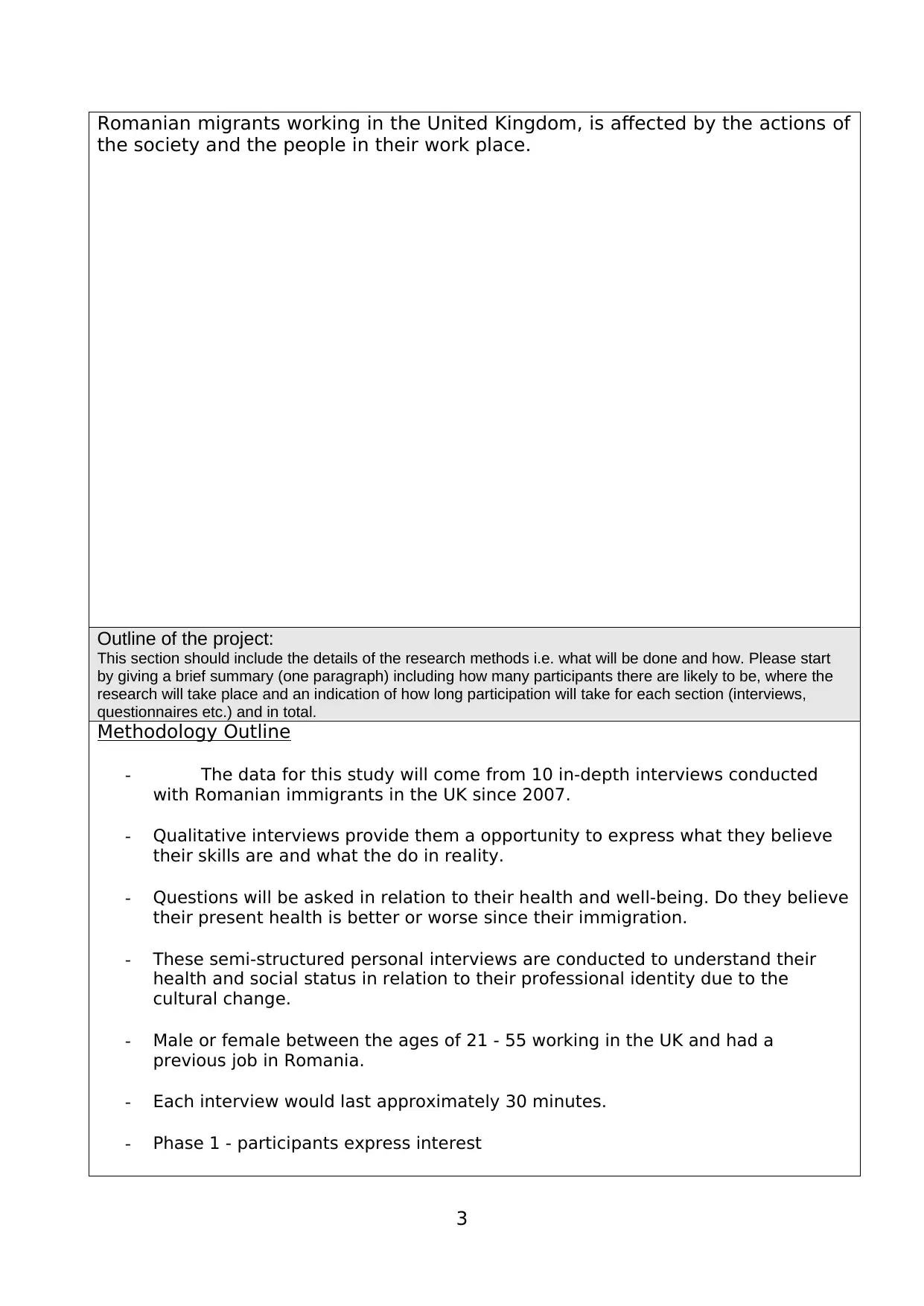
Romanian migrants working in the United Kingdom, is affected by the actions of
the society and the people in their work place.
Outline of the project:
This section should include the details of the research methods i.e. what will be done and how. Please start
by giving a brief summary (one paragraph) including how many participants there are likely to be, where the
research will take place and an indication of how long participation will take for each section (interviews,
questionnaires etc.) and in total.
Methodology Outline
- The data for this study will come from 10 in-depth interviews conducted
with Romanian immigrants in the UK since 2007.
- Qualitative interviews provide them a opportunity to express what they believe
their skills are and what the do in reality.
- Questions will be asked in relation to their health and well-being. Do they believe
their present health is better or worse since their immigration.
- These semi-structured personal interviews are conducted to understand their
health and social status in relation to their professional identity due to the
cultural change.
- Male or female between the ages of 21 - 55 working in the UK and had a
previous job in Romania.
- Each interview would last approximately 30 minutes.
- Phase 1 - participants express interest
3
the society and the people in their work place.
Outline of the project:
This section should include the details of the research methods i.e. what will be done and how. Please start
by giving a brief summary (one paragraph) including how many participants there are likely to be, where the
research will take place and an indication of how long participation will take for each section (interviews,
questionnaires etc.) and in total.
Methodology Outline
- The data for this study will come from 10 in-depth interviews conducted
with Romanian immigrants in the UK since 2007.
- Qualitative interviews provide them a opportunity to express what they believe
their skills are and what the do in reality.
- Questions will be asked in relation to their health and well-being. Do they believe
their present health is better or worse since their immigration.
- These semi-structured personal interviews are conducted to understand their
health and social status in relation to their professional identity due to the
cultural change.
- Male or female between the ages of 21 - 55 working in the UK and had a
previous job in Romania.
- Each interview would last approximately 30 minutes.
- Phase 1 - participants express interest
3
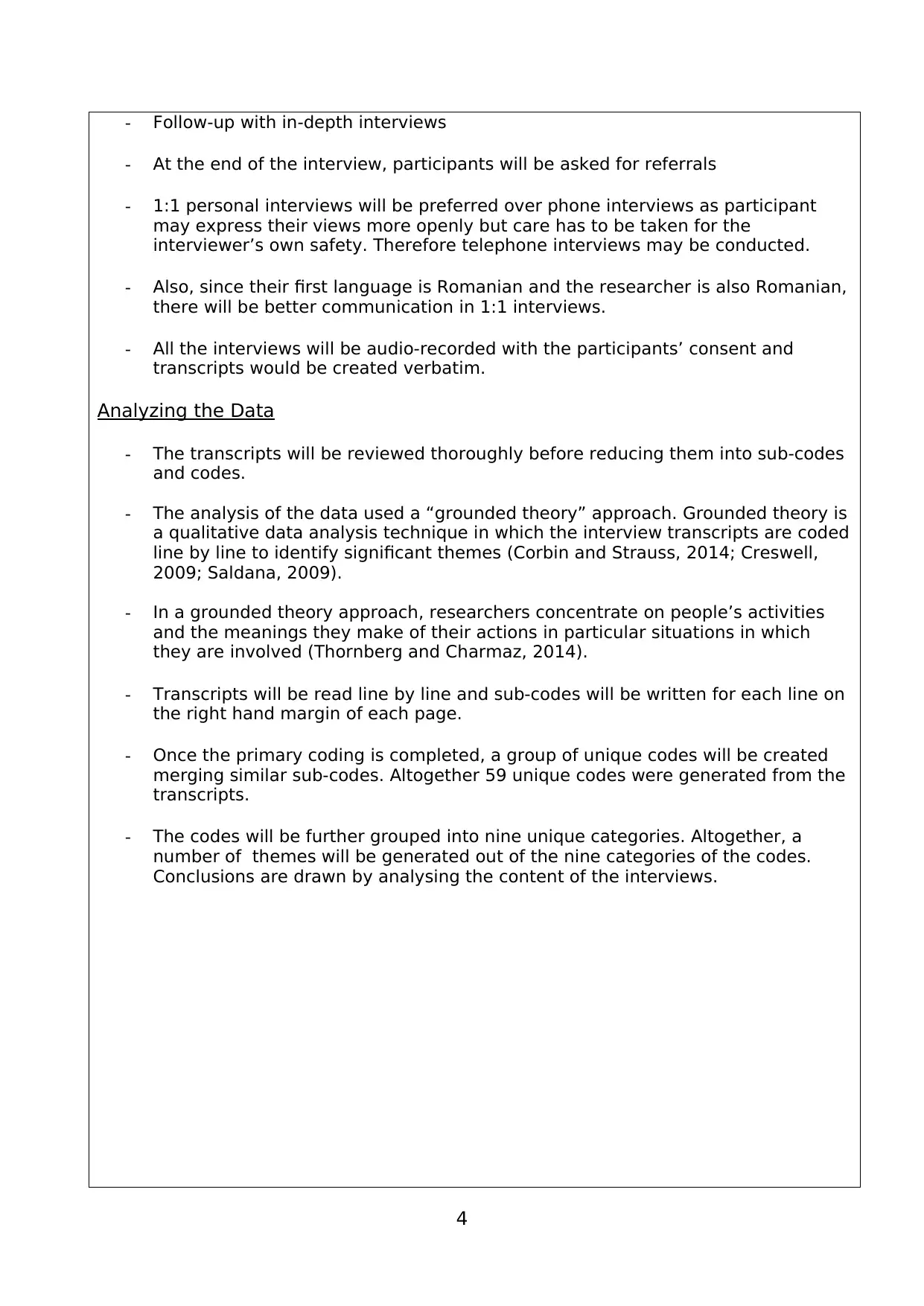
- Follow-up with in-depth interviews
- At the end of the interview, participants will be asked for referrals
- 1:1 personal interviews will be preferred over phone interviews as participant
may express their views more openly but care has to be taken for the
interviewer’s own safety. Therefore telephone interviews may be conducted.
- Also, since their first language is Romanian and the researcher is also Romanian,
there will be better communication in 1:1 interviews.
- All the interviews will be audio-recorded with the participants’ consent and
transcripts would be created verbatim.
Analyzing the Data
- The transcripts will be reviewed thoroughly before reducing them into sub-codes
and codes.
- The analysis of the data used a “grounded theory” approach. Grounded theory is
a qualitative data analysis technique in which the interview transcripts are coded
line by line to identify significant themes (Corbin and Strauss, 2014; Creswell,
2009; Saldana, 2009).
- In a grounded theory approach, researchers concentrate on people’s activities
and the meanings they make of their actions in particular situations in which
they are involved (Thornberg and Charmaz, 2014).
- Transcripts will be read line by line and sub-codes will be written for each line on
the right hand margin of each page.
- Once the primary coding is completed, a group of unique codes will be created
merging similar sub-codes. Altogether 59 unique codes were generated from the
transcripts.
- The codes will be further grouped into nine unique categories. Altogether, a
number of themes will be generated out of the nine categories of the codes.
Conclusions are drawn by analysing the content of the interviews.
4
- At the end of the interview, participants will be asked for referrals
- 1:1 personal interviews will be preferred over phone interviews as participant
may express their views more openly but care has to be taken for the
interviewer’s own safety. Therefore telephone interviews may be conducted.
- Also, since their first language is Romanian and the researcher is also Romanian,
there will be better communication in 1:1 interviews.
- All the interviews will be audio-recorded with the participants’ consent and
transcripts would be created verbatim.
Analyzing the Data
- The transcripts will be reviewed thoroughly before reducing them into sub-codes
and codes.
- The analysis of the data used a “grounded theory” approach. Grounded theory is
a qualitative data analysis technique in which the interview transcripts are coded
line by line to identify significant themes (Corbin and Strauss, 2014; Creswell,
2009; Saldana, 2009).
- In a grounded theory approach, researchers concentrate on people’s activities
and the meanings they make of their actions in particular situations in which
they are involved (Thornberg and Charmaz, 2014).
- Transcripts will be read line by line and sub-codes will be written for each line on
the right hand margin of each page.
- Once the primary coding is completed, a group of unique codes will be created
merging similar sub-codes. Altogether 59 unique codes were generated from the
transcripts.
- The codes will be further grouped into nine unique categories. Altogether, a
number of themes will be generated out of the nine categories of the codes.
Conclusions are drawn by analysing the content of the interviews.
4
Secure Best Marks with AI Grader
Need help grading? Try our AI Grader for instant feedback on your assignments.
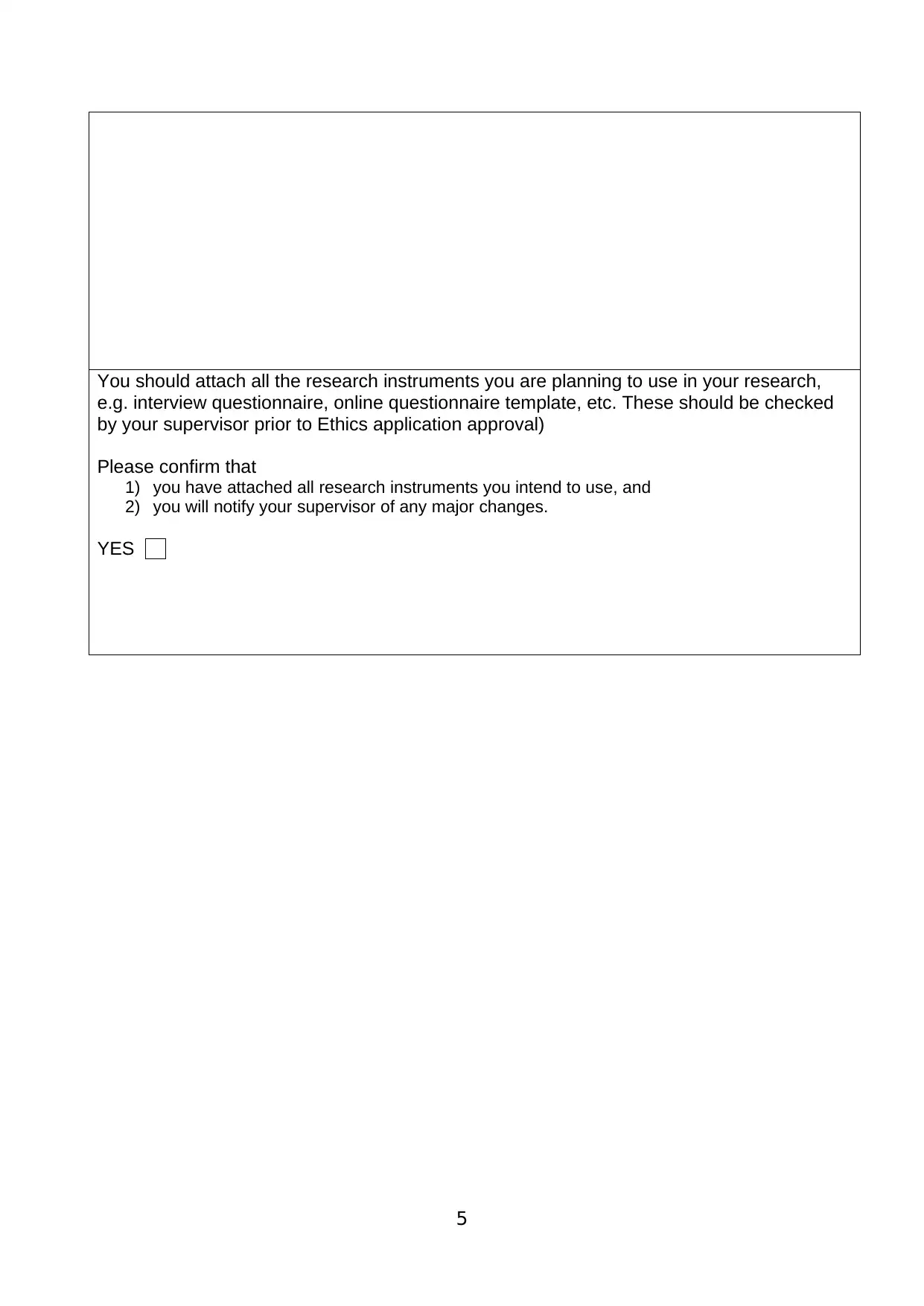
You should attach all the research instruments you are planning to use in your research,
e.g. interview questionnaire, online questionnaire template, etc. These should be checked
by your supervisor prior to Ethics application approval)
Please confirm that
1) you have attached all research instruments you intend to use, and
2) you will notify your supervisor of any major changes.
YES
5
e.g. interview questionnaire, online questionnaire template, etc. These should be checked
by your supervisor prior to Ethics application approval)
Please confirm that
1) you have attached all research instruments you intend to use, and
2) you will notify your supervisor of any major changes.
YES
5
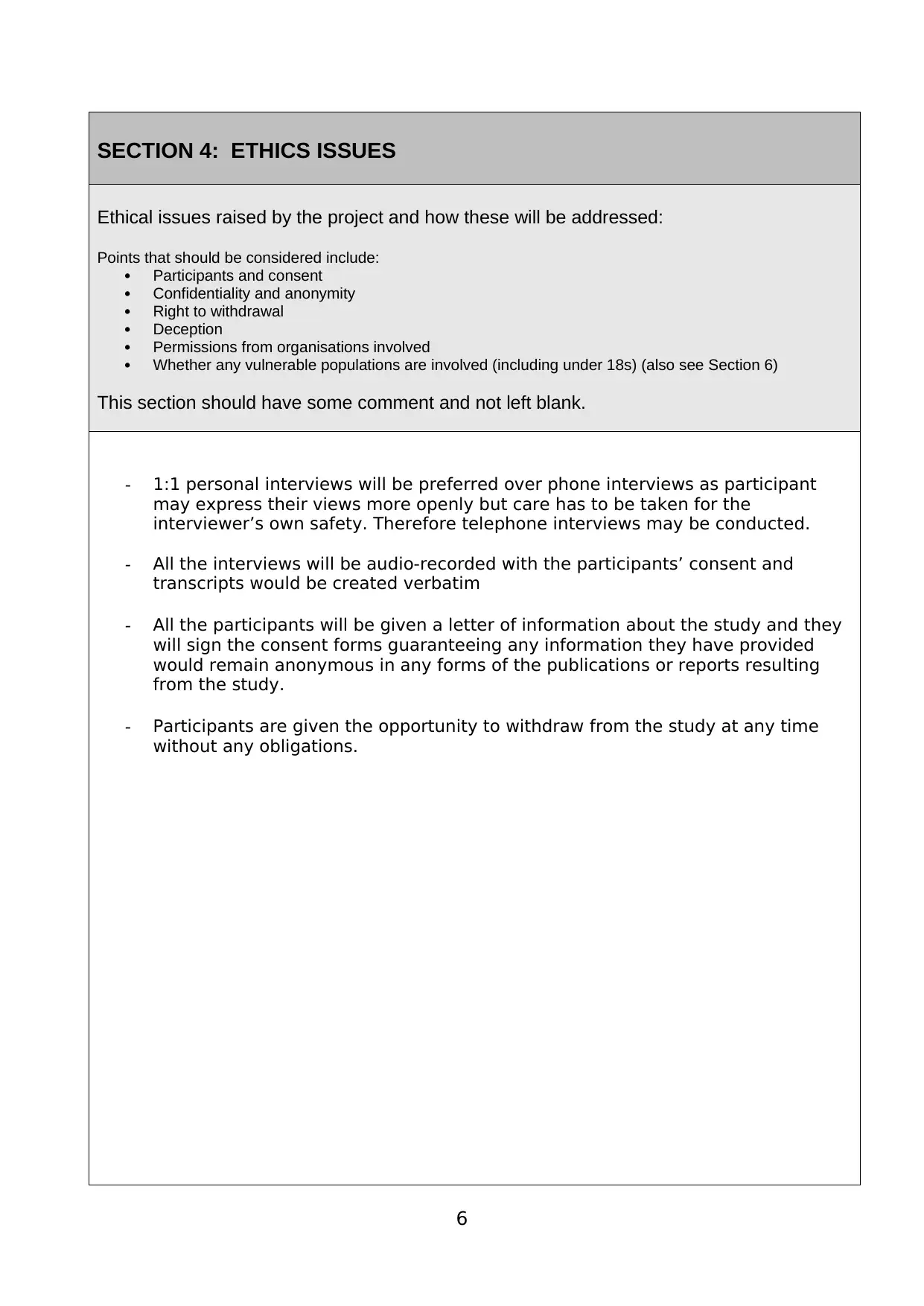
SECTION 4: ETHICS ISSUES
Ethical issues raised by the project and how these will be addressed:
Points that should be considered include:
Participants and consent
Confidentiality and anonymity
Right to withdrawal
Deception
Permissions from organisations involved
Whether any vulnerable populations are involved (including under 18s) (also see Section 6)
This section should have some comment and not left blank.
- 1:1 personal interviews will be preferred over phone interviews as participant
may express their views more openly but care has to be taken for the
interviewer’s own safety. Therefore telephone interviews may be conducted.
- All the interviews will be audio-recorded with the participants’ consent and
transcripts would be created verbatim
- All the participants will be given a letter of information about the study and they
will sign the consent forms guaranteeing any information they have provided
would remain anonymous in any forms of the publications or reports resulting
from the study.
- Participants are given the opportunity to withdraw from the study at any time
without any obligations.
6
Ethical issues raised by the project and how these will be addressed:
Points that should be considered include:
Participants and consent
Confidentiality and anonymity
Right to withdrawal
Deception
Permissions from organisations involved
Whether any vulnerable populations are involved (including under 18s) (also see Section 6)
This section should have some comment and not left blank.
- 1:1 personal interviews will be preferred over phone interviews as participant
may express their views more openly but care has to be taken for the
interviewer’s own safety. Therefore telephone interviews may be conducted.
- All the interviews will be audio-recorded with the participants’ consent and
transcripts would be created verbatim
- All the participants will be given a letter of information about the study and they
will sign the consent forms guaranteeing any information they have provided
would remain anonymous in any forms of the publications or reports resulting
from the study.
- Participants are given the opportunity to withdraw from the study at any time
without any obligations.
6
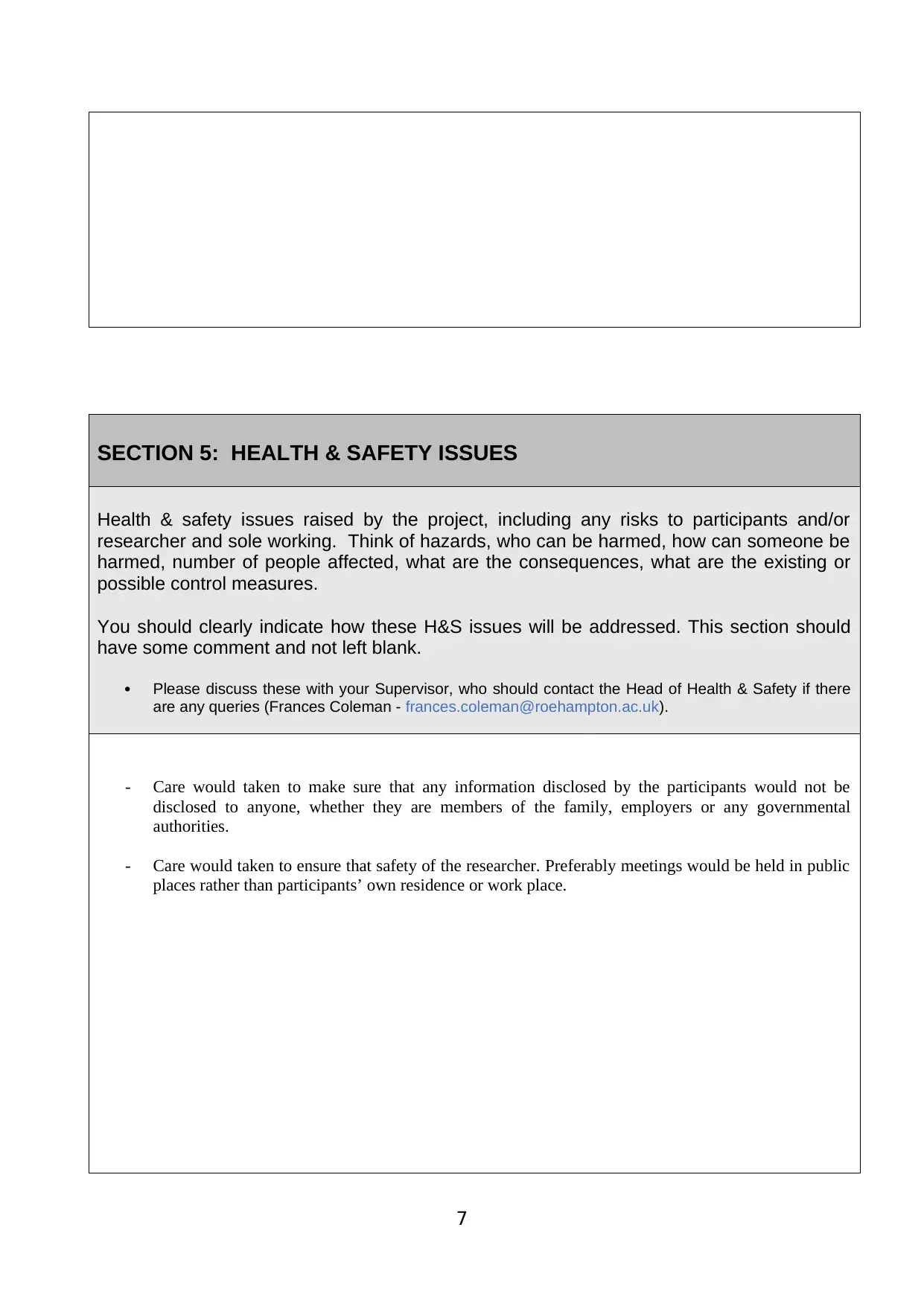
SECTION 5: HEALTH & SAFETY ISSUES
Health & safety issues raised by the project, including any risks to participants and/or
researcher and sole working. Think of hazards, who can be harmed, how can someone be
harmed, number of people affected, what are the consequences, what are the existing or
possible control measures.
You should clearly indicate how these H&S issues will be addressed. This section should
have some comment and not left blank.
Please discuss these with your Supervisor, who should contact the Head of Health & Safety if there
are any queries (Frances Coleman - frances.coleman@roehampton.ac.uk).
- Care would taken to make sure that any information disclosed by the participants would not be
disclosed to anyone, whether they are members of the family, employers or any governmental
authorities.
- Care would taken to ensure that safety of the researcher. Preferably meetings would be held in public
places rather than participants’ own residence or work place.
7
Health & safety issues raised by the project, including any risks to participants and/or
researcher and sole working. Think of hazards, who can be harmed, how can someone be
harmed, number of people affected, what are the consequences, what are the existing or
possible control measures.
You should clearly indicate how these H&S issues will be addressed. This section should
have some comment and not left blank.
Please discuss these with your Supervisor, who should contact the Head of Health & Safety if there
are any queries (Frances Coleman - frances.coleman@roehampton.ac.uk).
- Care would taken to make sure that any information disclosed by the participants would not be
disclosed to anyone, whether they are members of the family, employers or any governmental
authorities.
- Care would taken to ensure that safety of the researcher. Preferably meetings would be held in public
places rather than participants’ own residence or work place.
7
Paraphrase This Document
Need a fresh take? Get an instant paraphrase of this document with our AI Paraphraser

8
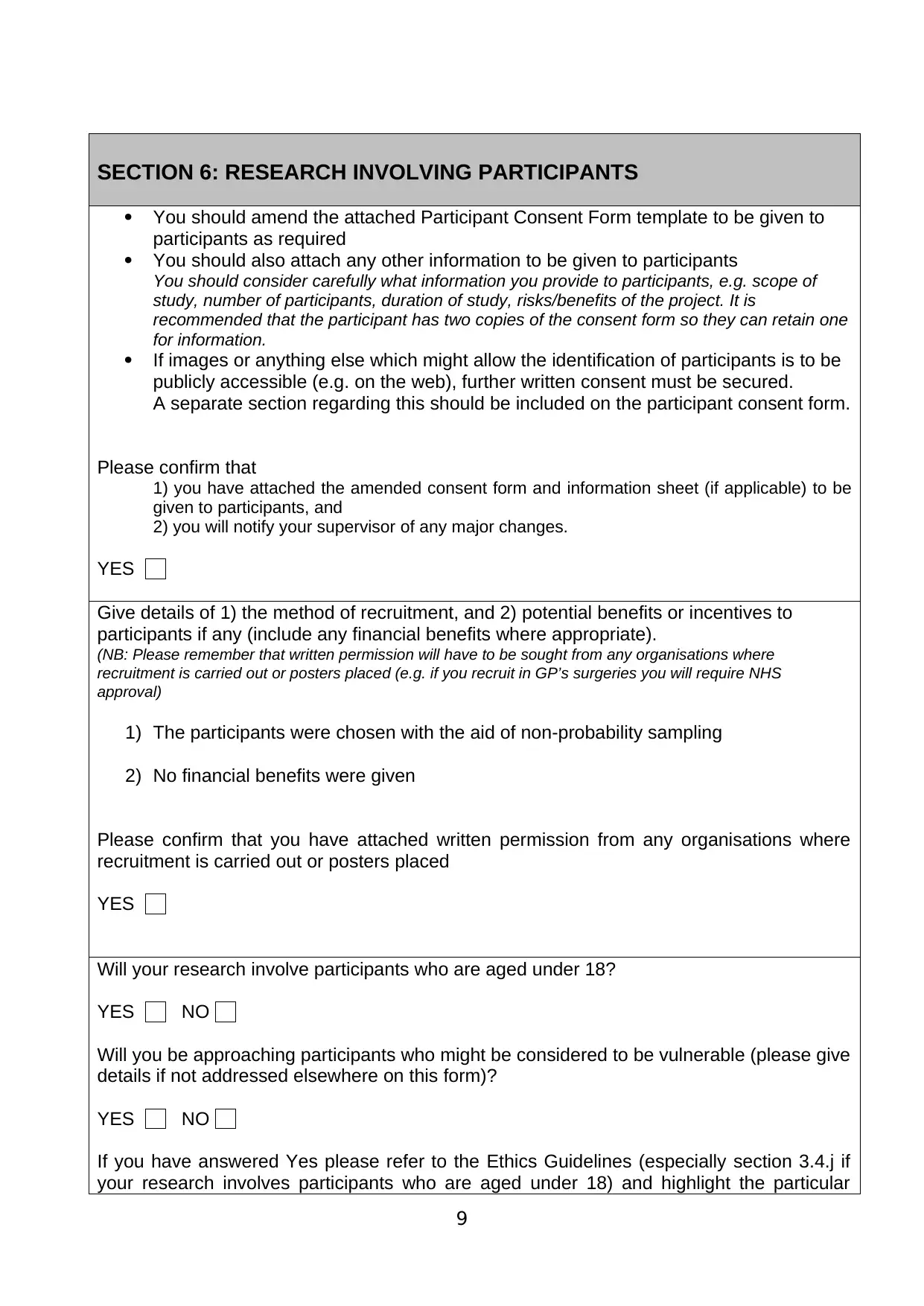
SECTION 6: RESEARCH INVOLVING PARTICIPANTS
You should amend the attached Participant Consent Form template to be given to
participants as required
You should also attach any other information to be given to participants
You should consider carefully what information you provide to participants, e.g. scope of
study, number of participants, duration of study, risks/benefits of the project. It is
recommended that the participant has two copies of the consent form so they can retain one
for information.
If images or anything else which might allow the identification of participants is to be
publicly accessible (e.g. on the web), further written consent must be secured.
A separate section regarding this should be included on the participant consent form.
Please confirm that
1) you have attached the amended consent form and information sheet (if applicable) to be
given to participants, and
2) you will notify your supervisor of any major changes.
YES
Give details of 1) the method of recruitment, and 2) potential benefits or incentives to
participants if any (include any financial benefits where appropriate).
(NB: Please remember that written permission will have to be sought from any organisations where
recruitment is carried out or posters placed (e.g. if you recruit in GP’s surgeries you will require NHS
approval)
1) The participants were chosen with the aid of non-probability sampling
2) No financial benefits were given
Please confirm that you have attached written permission from any organisations where
recruitment is carried out or posters placed
YES
Will your research involve participants who are aged under 18?
YES NO
Will you be approaching participants who might be considered to be vulnerable (please give
details if not addressed elsewhere on this form)?
YES NO
If you have answered Yes please refer to the Ethics Guidelines (especially section 3.4.j if
your research involves participants who are aged under 18) and highlight the particular
9
You should amend the attached Participant Consent Form template to be given to
participants as required
You should also attach any other information to be given to participants
You should consider carefully what information you provide to participants, e.g. scope of
study, number of participants, duration of study, risks/benefits of the project. It is
recommended that the participant has two copies of the consent form so they can retain one
for information.
If images or anything else which might allow the identification of participants is to be
publicly accessible (e.g. on the web), further written consent must be secured.
A separate section regarding this should be included on the participant consent form.
Please confirm that
1) you have attached the amended consent form and information sheet (if applicable) to be
given to participants, and
2) you will notify your supervisor of any major changes.
YES
Give details of 1) the method of recruitment, and 2) potential benefits or incentives to
participants if any (include any financial benefits where appropriate).
(NB: Please remember that written permission will have to be sought from any organisations where
recruitment is carried out or posters placed (e.g. if you recruit in GP’s surgeries you will require NHS
approval)
1) The participants were chosen with the aid of non-probability sampling
2) No financial benefits were given
Please confirm that you have attached written permission from any organisations where
recruitment is carried out or posters placed
YES
Will your research involve participants who are aged under 18?
YES NO
Will you be approaching participants who might be considered to be vulnerable (please give
details if not addressed elsewhere on this form)?
YES NO
If you have answered Yes please refer to the Ethics Guidelines (especially section 3.4.j if
your research involves participants who are aged under 18) and highlight the particular
9
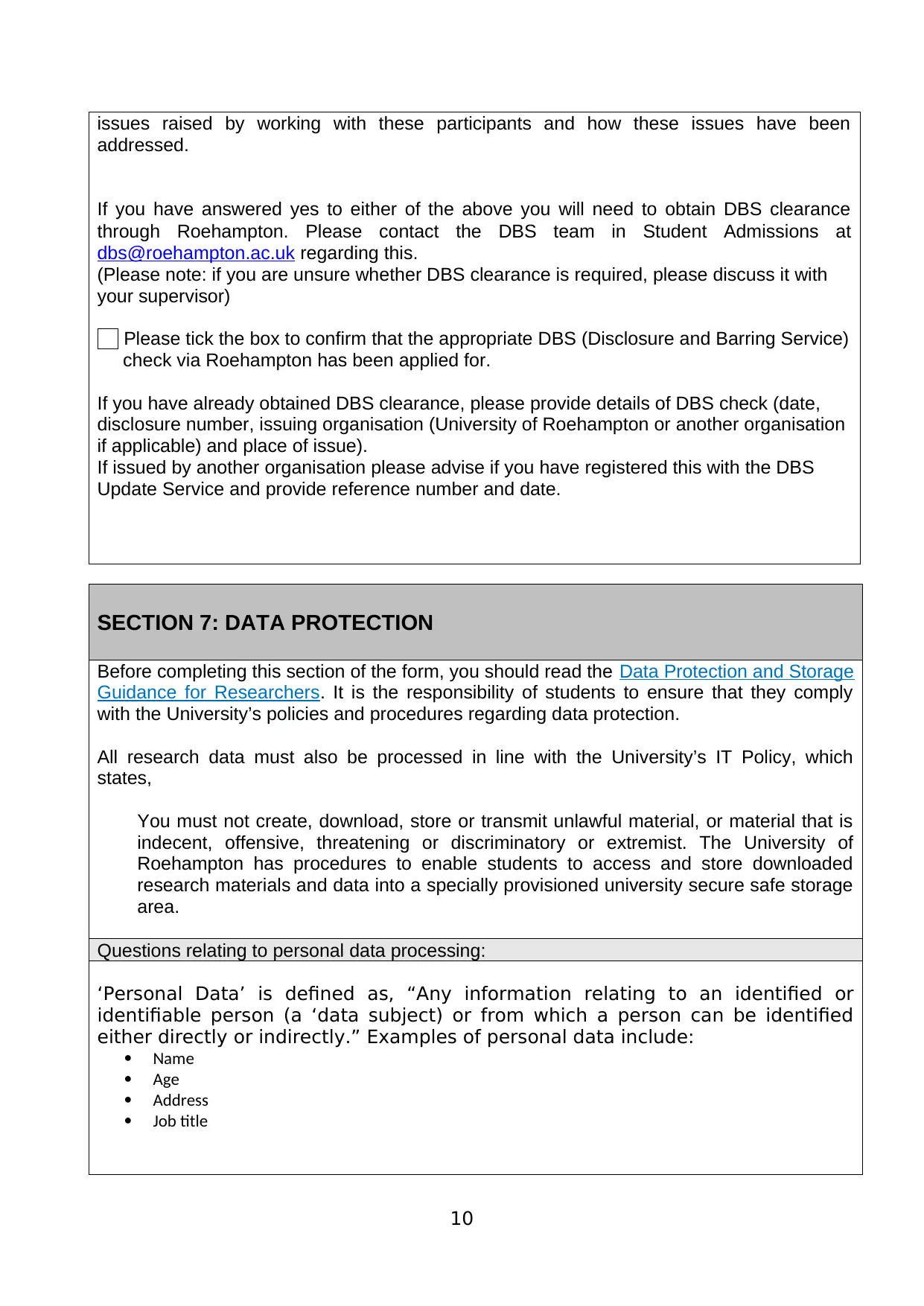
issues raised by working with these participants and how these issues have been
addressed.
If you have answered yes to either of the above you will need to obtain DBS clearance
through Roehampton. Please contact the DBS team in Student Admissions at
dbs@roehampton.ac.uk regarding this.
(Please note: if you are unsure whether DBS clearance is required, please discuss it with
your supervisor)
Please tick the box to confirm that the appropriate DBS (Disclosure and Barring Service)
check via Roehampton has been applied for.
If you have already obtained DBS clearance, please provide details of DBS check (date,
disclosure number, issuing organisation (University of Roehampton or another organisation
if applicable) and place of issue).
If issued by another organisation please advise if you have registered this with the DBS
Update Service and provide reference number and date.
SECTION 7: DATA PROTECTION
Before completing this section of the form, you should read the Data Protection and Storage
Guidance for Researchers. It is the responsibility of students to ensure that they comply
with the University’s policies and procedures regarding data protection.
All research data must also be processed in line with the University’s IT Policy, which
states,
You must not create, download, store or transmit unlawful material, or material that is
indecent, offensive, threatening or discriminatory or extremist. The University of
Roehampton has procedures to enable students to access and store downloaded
research materials and data into a specially provisioned university secure safe storage
area.
Questions relating to personal data processing:
‘Personal Data’ is defined as, “Any information relating to an identified or
identifiable person (a ‘data subject) or from which a person can be identified
either directly or indirectly.” Examples of personal data include:
Name
Age
Address
Job title
10
addressed.
If you have answered yes to either of the above you will need to obtain DBS clearance
through Roehampton. Please contact the DBS team in Student Admissions at
dbs@roehampton.ac.uk regarding this.
(Please note: if you are unsure whether DBS clearance is required, please discuss it with
your supervisor)
Please tick the box to confirm that the appropriate DBS (Disclosure and Barring Service)
check via Roehampton has been applied for.
If you have already obtained DBS clearance, please provide details of DBS check (date,
disclosure number, issuing organisation (University of Roehampton or another organisation
if applicable) and place of issue).
If issued by another organisation please advise if you have registered this with the DBS
Update Service and provide reference number and date.
SECTION 7: DATA PROTECTION
Before completing this section of the form, you should read the Data Protection and Storage
Guidance for Researchers. It is the responsibility of students to ensure that they comply
with the University’s policies and procedures regarding data protection.
All research data must also be processed in line with the University’s IT Policy, which
states,
You must not create, download, store or transmit unlawful material, or material that is
indecent, offensive, threatening or discriminatory or extremist. The University of
Roehampton has procedures to enable students to access and store downloaded
research materials and data into a specially provisioned university secure safe storage
area.
Questions relating to personal data processing:
‘Personal Data’ is defined as, “Any information relating to an identified or
identifiable person (a ‘data subject) or from which a person can be identified
either directly or indirectly.” Examples of personal data include:
Name
Age
Address
Job title
10
Secure Best Marks with AI Grader
Need help grading? Try our AI Grader for instant feedback on your assignments.
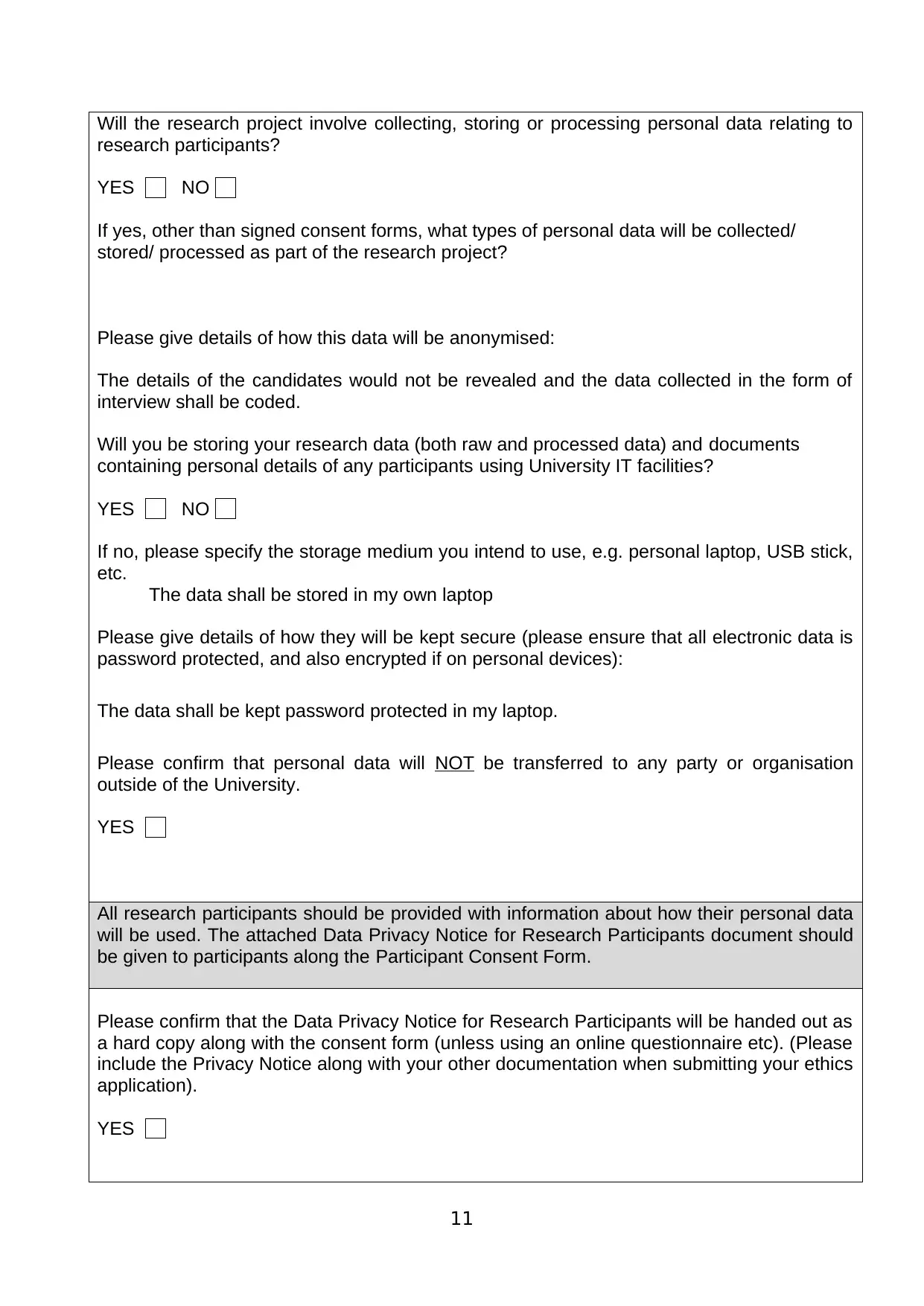
Will the research project involve collecting, storing or processing personal data relating to
research participants?
YES NO
If yes, other than signed consent forms, what types of personal data will be collected/
stored/ processed as part of the research project?
Please give details of how this data will be anonymised:
The details of the candidates would not be revealed and the data collected in the form of
interview shall be coded.
Will you be storing your research data (both raw and processed data) and documents
containing personal details of any participants using University IT facilities?
YES NO
If no, please specify the storage medium you intend to use, e.g. personal laptop, USB stick,
etc.
The data shall be stored in my own laptop
Please give details of how they will be kept secure (please ensure that all electronic data is
password protected, and also encrypted if on personal devices):
The data shall be kept password protected in my laptop.
Please confirm that personal data will NOT be transferred to any party or organisation
outside of the University.
YES
All research participants should be provided with information about how their personal data
will be used. The attached Data Privacy Notice for Research Participants document should
be given to participants along the Participant Consent Form.
Please confirm that the Data Privacy Notice for Research Participants will be handed out as
a hard copy along with the consent form (unless using an online questionnaire etc). (Please
include the Privacy Notice along with your other documentation when submitting your ethics
application).
YES
11
research participants?
YES NO
If yes, other than signed consent forms, what types of personal data will be collected/
stored/ processed as part of the research project?
Please give details of how this data will be anonymised:
The details of the candidates would not be revealed and the data collected in the form of
interview shall be coded.
Will you be storing your research data (both raw and processed data) and documents
containing personal details of any participants using University IT facilities?
YES NO
If no, please specify the storage medium you intend to use, e.g. personal laptop, USB stick,
etc.
The data shall be stored in my own laptop
Please give details of how they will be kept secure (please ensure that all electronic data is
password protected, and also encrypted if on personal devices):
The data shall be kept password protected in my laptop.
Please confirm that personal data will NOT be transferred to any party or organisation
outside of the University.
YES
All research participants should be provided with information about how their personal data
will be used. The attached Data Privacy Notice for Research Participants document should
be given to participants along the Participant Consent Form.
Please confirm that the Data Privacy Notice for Research Participants will be handed out as
a hard copy along with the consent form (unless using an online questionnaire etc). (Please
include the Privacy Notice along with your other documentation when submitting your ethics
application).
YES
11

12
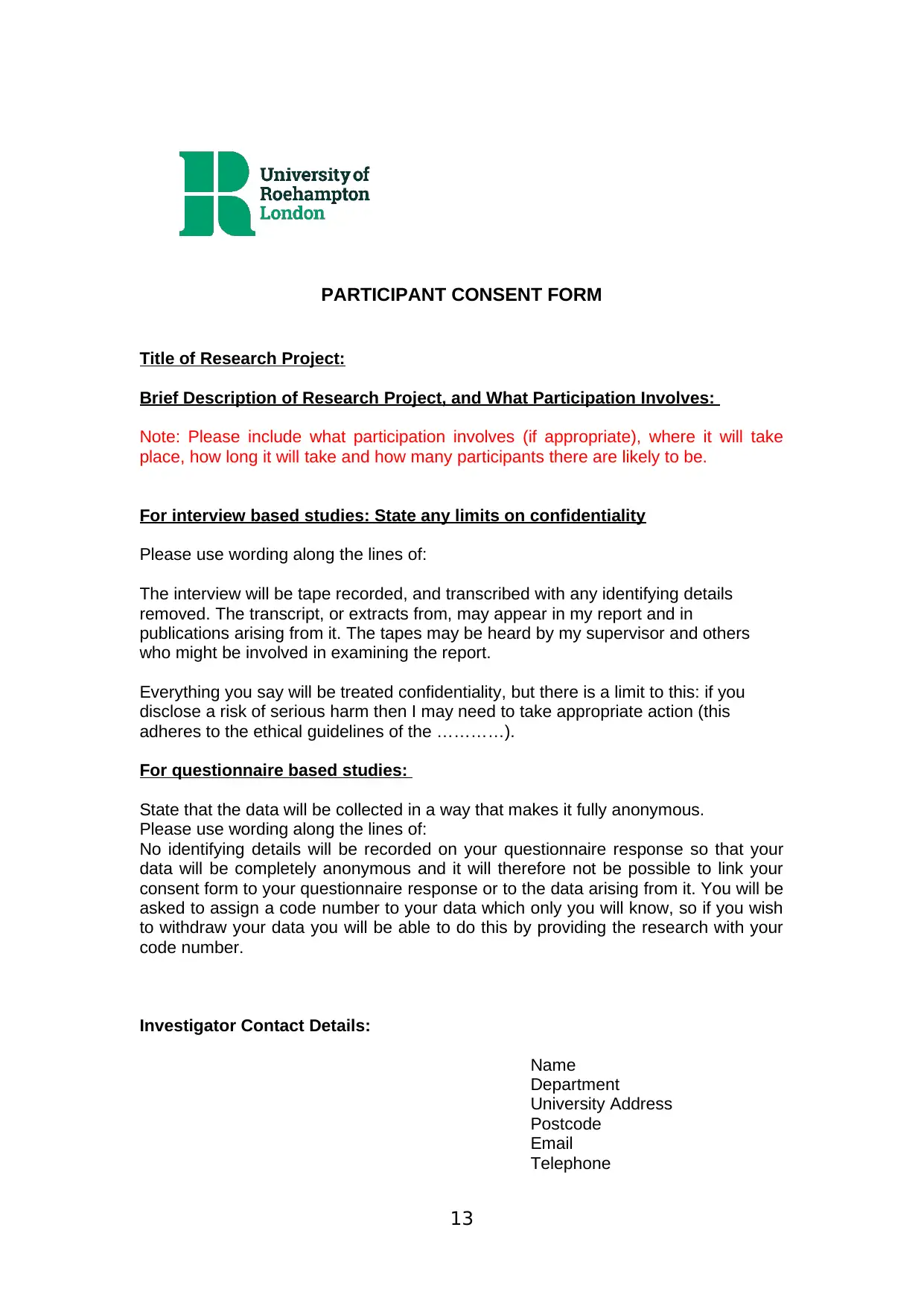
PARTICIPANT CONSENT FORM
Title of Research Project:
Brief Description of Research Project, and What Participation Involves:
Note: Please include what participation involves (if appropriate), where it will take
place, how long it will take and how many participants there are likely to be.
For interview based studies: State any limits on confidentiality
Please use wording along the lines of:
The interview will be tape recorded, and transcribed with any identifying details
removed. The transcript, or extracts from, may appear in my report and in
publications arising from it. The tapes may be heard by my supervisor and others
who might be involved in examining the report.
Everything you say will be treated confidentiality, but there is a limit to this: if you
disclose a risk of serious harm then I may need to take appropriate action (this
adheres to the ethical guidelines of the …………).
For questionnaire based studies:
State that the data will be collected in a way that makes it fully anonymous.
Please use wording along the lines of:
No identifying details will be recorded on your questionnaire response so that your
data will be completely anonymous and it will therefore not be possible to link your
consent form to your questionnaire response or to the data arising from it. You will be
asked to assign a code number to your data which only you will know, so if you wish
to withdraw your data you will be able to do this by providing the research with your
code number.
Investigator Contact Details:
Name
Department
University Address
Postcode
Email
Telephone
13
Title of Research Project:
Brief Description of Research Project, and What Participation Involves:
Note: Please include what participation involves (if appropriate), where it will take
place, how long it will take and how many participants there are likely to be.
For interview based studies: State any limits on confidentiality
Please use wording along the lines of:
The interview will be tape recorded, and transcribed with any identifying details
removed. The transcript, or extracts from, may appear in my report and in
publications arising from it. The tapes may be heard by my supervisor and others
who might be involved in examining the report.
Everything you say will be treated confidentiality, but there is a limit to this: if you
disclose a risk of serious harm then I may need to take appropriate action (this
adheres to the ethical guidelines of the …………).
For questionnaire based studies:
State that the data will be collected in a way that makes it fully anonymous.
Please use wording along the lines of:
No identifying details will be recorded on your questionnaire response so that your
data will be completely anonymous and it will therefore not be possible to link your
consent form to your questionnaire response or to the data arising from it. You will be
asked to assign a code number to your data which only you will know, so if you wish
to withdraw your data you will be able to do this by providing the research with your
code number.
Investigator Contact Details:
Name
Department
University Address
Postcode
Telephone
13
Paraphrase This Document
Need a fresh take? Get an instant paraphrase of this document with our AI Paraphraser
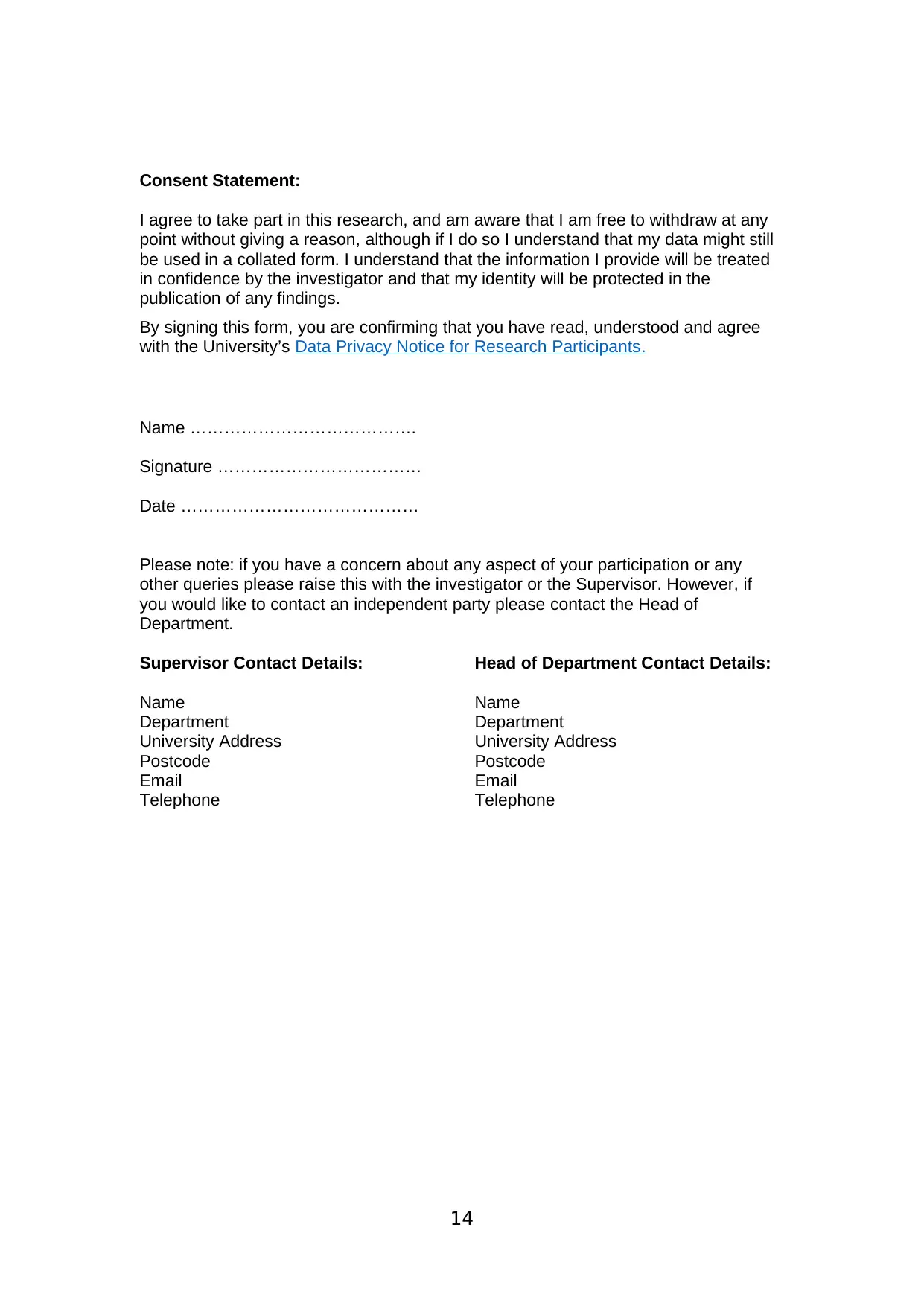
Consent Statement:
I agree to take part in this research, and am aware that I am free to withdraw at any
point without giving a reason, although if I do so I understand that my data might still
be used in a collated form. I understand that the information I provide will be treated
in confidence by the investigator and that my identity will be protected in the
publication of any findings.
By signing this form, you are confirming that you have read, understood and agree
with the University’s Data Privacy Notice for Research Participants.
Name ………………………………….
Signature ………………………………
Date ……………………………………
Please note: if you have a concern about any aspect of your participation or any
other queries please raise this with the investigator or the Supervisor. However, if
you would like to contact an independent party please contact the Head of
Department.
Supervisor Contact Details: Head of Department Contact Details:
Name Name
Department Department
University Address University Address
Postcode Postcode
Email Email
Telephone Telephone
14
I agree to take part in this research, and am aware that I am free to withdraw at any
point without giving a reason, although if I do so I understand that my data might still
be used in a collated form. I understand that the information I provide will be treated
in confidence by the investigator and that my identity will be protected in the
publication of any findings.
By signing this form, you are confirming that you have read, understood and agree
with the University’s Data Privacy Notice for Research Participants.
Name ………………………………….
Signature ………………………………
Date ……………………………………
Please note: if you have a concern about any aspect of your participation or any
other queries please raise this with the investigator or the Supervisor. However, if
you would like to contact an independent party please contact the Head of
Department.
Supervisor Contact Details: Head of Department Contact Details:
Name Name
Department Department
University Address University Address
Postcode Postcode
Email Email
Telephone Telephone
14
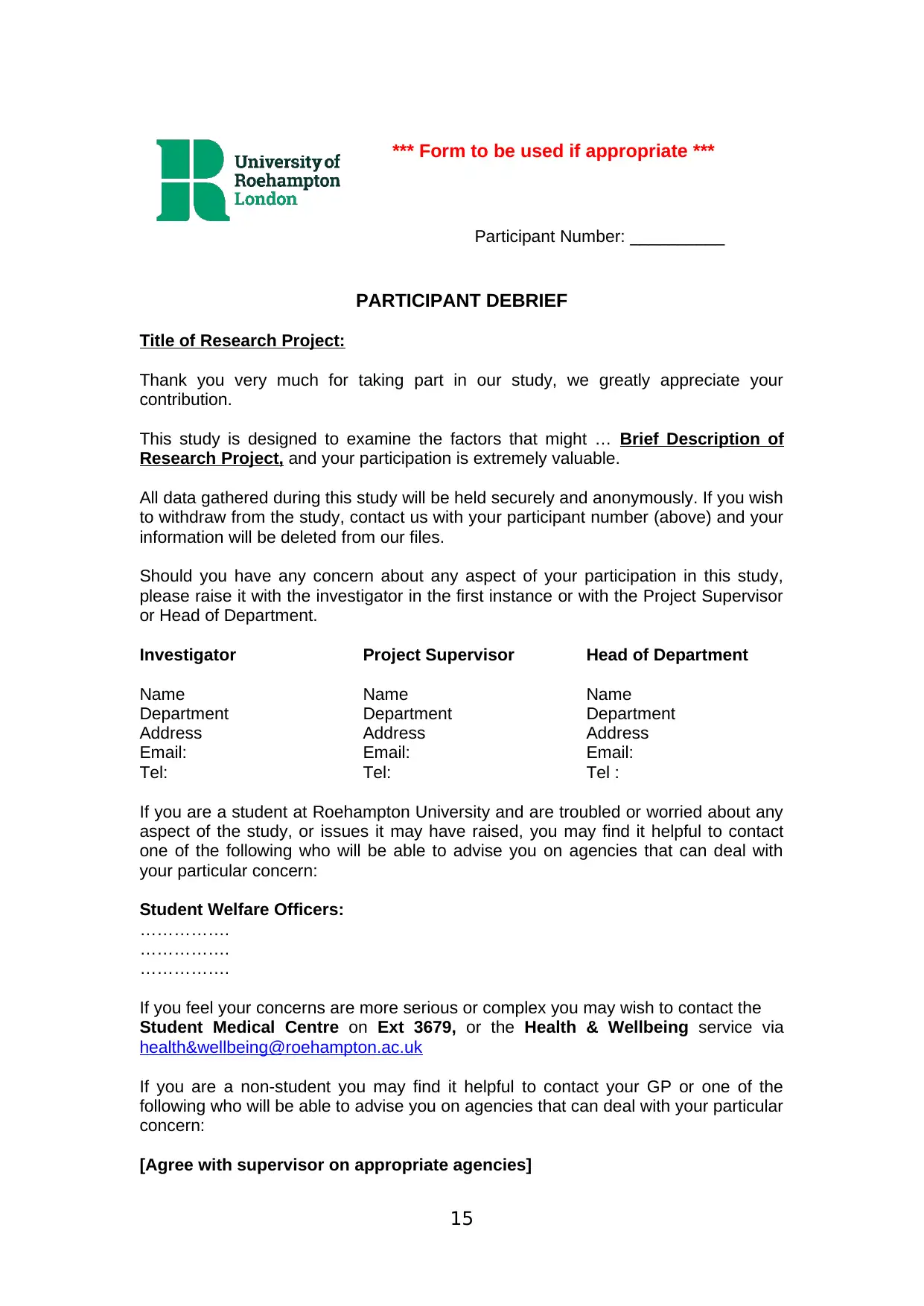
*** Form to be used if appropriate ***
Participant Number: __________
PARTICIPANT DEBRIEF
Title of Research Project:
Thank you very much for taking part in our study, we greatly appreciate your
contribution.
This study is designed to examine the factors that might … Brief Description of
Research Project, and your participation is extremely valuable.
All data gathered during this study will be held securely and anonymously. If you wish
to withdraw from the study, contact us with your participant number (above) and your
information will be deleted from our files.
Should you have any concern about any aspect of your participation in this study,
please raise it with the investigator in the first instance or with the Project Supervisor
or Head of Department.
Investigator Project Supervisor Head of Department
Name Name Name
Department Department Department
Address Address Address
Email: Email: Email:
Tel: Tel: Tel :
If you are a student at Roehampton University and are troubled or worried about any
aspect of the study, or issues it may have raised, you may find it helpful to contact
one of the following who will be able to advise you on agencies that can deal with
your particular concern:
Student Welfare Officers:
…………….
…………….
…………….
If you feel your concerns are more serious or complex you may wish to contact the
Student Medical Centre on Ext 3679, or the Health & Wellbeing service via
health&wellbeing@roehampton.ac.uk
If you are a non-student you may find it helpful to contact your GP or one of the
following who will be able to advise you on agencies that can deal with your particular
concern:
[Agree with supervisor on appropriate agencies]
15
Participant Number: __________
PARTICIPANT DEBRIEF
Title of Research Project:
Thank you very much for taking part in our study, we greatly appreciate your
contribution.
This study is designed to examine the factors that might … Brief Description of
Research Project, and your participation is extremely valuable.
All data gathered during this study will be held securely and anonymously. If you wish
to withdraw from the study, contact us with your participant number (above) and your
information will be deleted from our files.
Should you have any concern about any aspect of your participation in this study,
please raise it with the investigator in the first instance or with the Project Supervisor
or Head of Department.
Investigator Project Supervisor Head of Department
Name Name Name
Department Department Department
Address Address Address
Email: Email: Email:
Tel: Tel: Tel :
If you are a student at Roehampton University and are troubled or worried about any
aspect of the study, or issues it may have raised, you may find it helpful to contact
one of the following who will be able to advise you on agencies that can deal with
your particular concern:
Student Welfare Officers:
…………….
…………….
…………….
If you feel your concerns are more serious or complex you may wish to contact the
Student Medical Centre on Ext 3679, or the Health & Wellbeing service via
health&wellbeing@roehampton.ac.uk
If you are a non-student you may find it helpful to contact your GP or one of the
following who will be able to advise you on agencies that can deal with your particular
concern:
[Agree with supervisor on appropriate agencies]
15
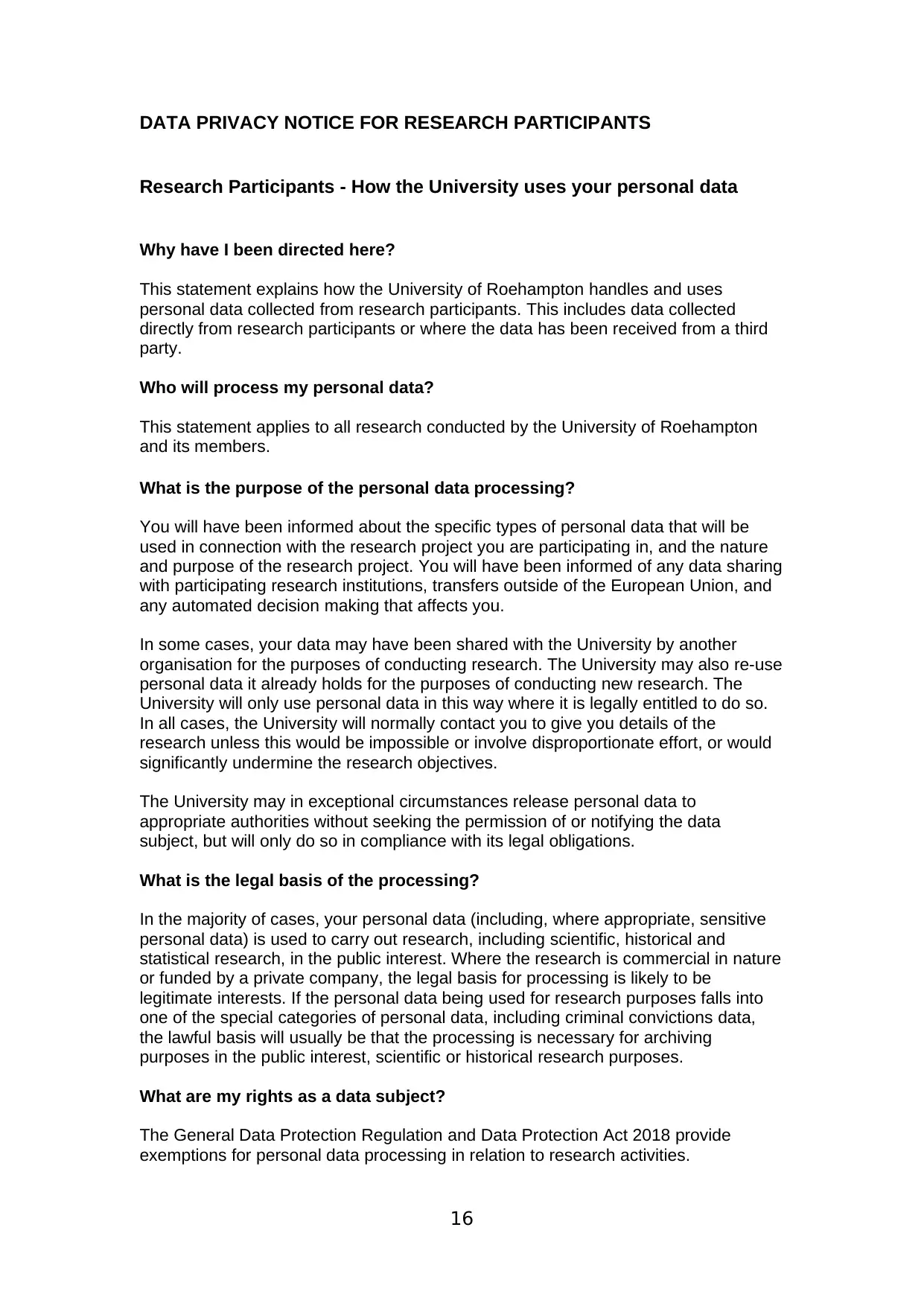
DATA PRIVACY NOTICE FOR RESEARCH PARTICIPANTS
Research Participants - How the University uses your personal data
Why have I been directed here?
This statement explains how the University of Roehampton handles and uses
personal data collected from research participants. This includes data collected
directly from research participants or where the data has been received from a third
party.
Who will process my personal data?
This statement applies to all research conducted by the University of Roehampton
and its members.
What is the purpose of the personal data processing?
You will have been informed about the specific types of personal data that will be
used in connection with the research project you are participating in, and the nature
and purpose of the research project. You will have been informed of any data sharing
with participating research institutions, transfers outside of the European Union, and
any automated decision making that affects you.
In some cases, your data may have been shared with the University by another
organisation for the purposes of conducting research. The University may also re-use
personal data it already holds for the purposes of conducting new research. The
University will only use personal data in this way where it is legally entitled to do so.
In all cases, the University will normally contact you to give you details of the
research unless this would be impossible or involve disproportionate effort, or would
significantly undermine the research objectives.
The University may in exceptional circumstances release personal data to
appropriate authorities without seeking the permission of or notifying the data
subject, but will only do so in compliance with its legal obligations.
What is the legal basis of the processing?
In the majority of cases, your personal data (including, where appropriate, sensitive
personal data) is used to carry out research, including scientific, historical and
statistical research, in the public interest. Where the research is commercial in nature
or funded by a private company, the legal basis for processing is likely to be
legitimate interests. If the personal data being used for research purposes falls into
one of the special categories of personal data, including criminal convictions data,
the lawful basis will usually be that the processing is necessary for archiving
purposes in the public interest, scientific or historical research purposes.
What are my rights as a data subject?
The General Data Protection Regulation and Data Protection Act 2018 provide
exemptions for personal data processing in relation to research activities.
16
Research Participants - How the University uses your personal data
Why have I been directed here?
This statement explains how the University of Roehampton handles and uses
personal data collected from research participants. This includes data collected
directly from research participants or where the data has been received from a third
party.
Who will process my personal data?
This statement applies to all research conducted by the University of Roehampton
and its members.
What is the purpose of the personal data processing?
You will have been informed about the specific types of personal data that will be
used in connection with the research project you are participating in, and the nature
and purpose of the research project. You will have been informed of any data sharing
with participating research institutions, transfers outside of the European Union, and
any automated decision making that affects you.
In some cases, your data may have been shared with the University by another
organisation for the purposes of conducting research. The University may also re-use
personal data it already holds for the purposes of conducting new research. The
University will only use personal data in this way where it is legally entitled to do so.
In all cases, the University will normally contact you to give you details of the
research unless this would be impossible or involve disproportionate effort, or would
significantly undermine the research objectives.
The University may in exceptional circumstances release personal data to
appropriate authorities without seeking the permission of or notifying the data
subject, but will only do so in compliance with its legal obligations.
What is the legal basis of the processing?
In the majority of cases, your personal data (including, where appropriate, sensitive
personal data) is used to carry out research, including scientific, historical and
statistical research, in the public interest. Where the research is commercial in nature
or funded by a private company, the legal basis for processing is likely to be
legitimate interests. If the personal data being used for research purposes falls into
one of the special categories of personal data, including criminal convictions data,
the lawful basis will usually be that the processing is necessary for archiving
purposes in the public interest, scientific or historical research purposes.
What are my rights as a data subject?
The General Data Protection Regulation and Data Protection Act 2018 provide
exemptions for personal data processing in relation to research activities.
16
Secure Best Marks with AI Grader
Need help grading? Try our AI Grader for instant feedback on your assignments.
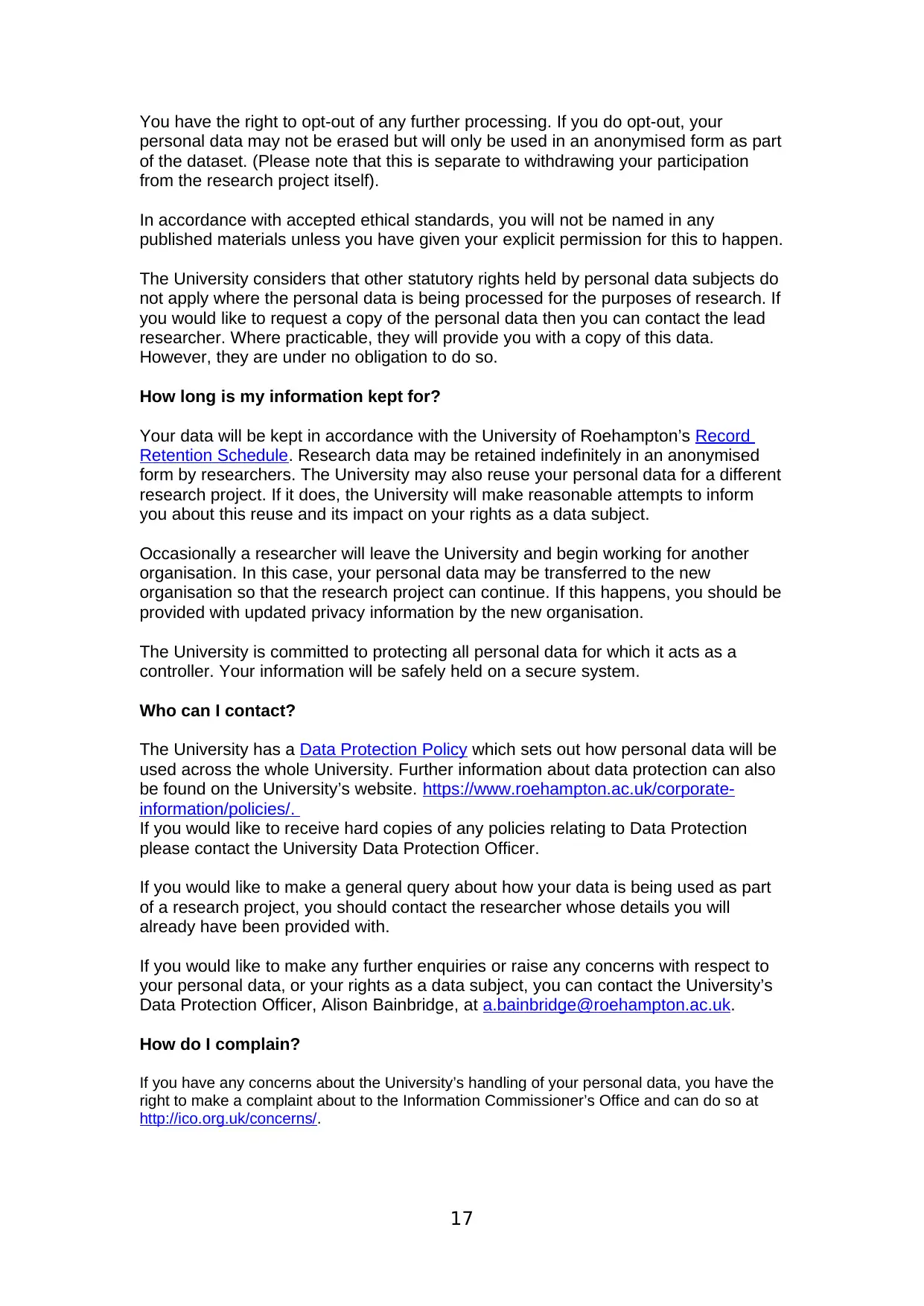
You have the right to opt-out of any further processing. If you do opt-out, your
personal data may not be erased but will only be used in an anonymised form as part
of the dataset. (Please note that this is separate to withdrawing your participation
from the research project itself).
In accordance with accepted ethical standards, you will not be named in any
published materials unless you have given your explicit permission for this to happen.
The University considers that other statutory rights held by personal data subjects do
not apply where the personal data is being processed for the purposes of research. If
you would like to request a copy of the personal data then you can contact the lead
researcher. Where practicable, they will provide you with a copy of this data.
However, they are under no obligation to do so.
How long is my information kept for?
Your data will be kept in accordance with the University of Roehampton’s Record
Retention Schedule. Research data may be retained indefinitely in an anonymised
form by researchers. The University may also reuse your personal data for a different
research project. If it does, the University will make reasonable attempts to inform
you about this reuse and its impact on your rights as a data subject.
Occasionally a researcher will leave the University and begin working for another
organisation. In this case, your personal data may be transferred to the new
organisation so that the research project can continue. If this happens, you should be
provided with updated privacy information by the new organisation.
The University is committed to protecting all personal data for which it acts as a
controller. Your information will be safely held on a secure system.
Who can I contact?
The University has a Data Protection Policy which sets out how personal data will be
used across the whole University. Further information about data protection can also
be found on the University’s website. https://www.roehampton.ac.uk/corporate-
information/policies/.
If you would like to receive hard copies of any policies relating to Data Protection
please contact the University Data Protection Officer.
If you would like to make a general query about how your data is being used as part
of a research project, you should contact the researcher whose details you will
already have been provided with.
If you would like to make any further enquiries or raise any concerns with respect to
your personal data, or your rights as a data subject, you can contact the University’s
Data Protection Officer, Alison Bainbridge, at a.bainbridge@roehampton.ac.uk.
How do I complain?
If you have any concerns about the University’s handling of your personal data, you have the
right to make a complaint about to the Information Commissioner’s Office and can do so at
http://ico.org.uk/concerns/.
17
personal data may not be erased but will only be used in an anonymised form as part
of the dataset. (Please note that this is separate to withdrawing your participation
from the research project itself).
In accordance with accepted ethical standards, you will not be named in any
published materials unless you have given your explicit permission for this to happen.
The University considers that other statutory rights held by personal data subjects do
not apply where the personal data is being processed for the purposes of research. If
you would like to request a copy of the personal data then you can contact the lead
researcher. Where practicable, they will provide you with a copy of this data.
However, they are under no obligation to do so.
How long is my information kept for?
Your data will be kept in accordance with the University of Roehampton’s Record
Retention Schedule. Research data may be retained indefinitely in an anonymised
form by researchers. The University may also reuse your personal data for a different
research project. If it does, the University will make reasonable attempts to inform
you about this reuse and its impact on your rights as a data subject.
Occasionally a researcher will leave the University and begin working for another
organisation. In this case, your personal data may be transferred to the new
organisation so that the research project can continue. If this happens, you should be
provided with updated privacy information by the new organisation.
The University is committed to protecting all personal data for which it acts as a
controller. Your information will be safely held on a secure system.
Who can I contact?
The University has a Data Protection Policy which sets out how personal data will be
used across the whole University. Further information about data protection can also
be found on the University’s website. https://www.roehampton.ac.uk/corporate-
information/policies/.
If you would like to receive hard copies of any policies relating to Data Protection
please contact the University Data Protection Officer.
If you would like to make a general query about how your data is being used as part
of a research project, you should contact the researcher whose details you will
already have been provided with.
If you would like to make any further enquiries or raise any concerns with respect to
your personal data, or your rights as a data subject, you can contact the University’s
Data Protection Officer, Alison Bainbridge, at a.bainbridge@roehampton.ac.uk.
How do I complain?
If you have any concerns about the University’s handling of your personal data, you have the
right to make a complaint about to the Information Commissioner’s Office and can do so at
http://ico.org.uk/concerns/.
17

*** Attach your research instruments,
written permission from organisations and
any other information to be given to
participants HERE ***
18
written permission from organisations and
any other information to be given to
participants HERE ***
18
1 out of 18
Related Documents
Your All-in-One AI-Powered Toolkit for Academic Success.
+13062052269
info@desklib.com
Available 24*7 on WhatsApp / Email
![[object Object]](/_next/static/media/star-bottom.7253800d.svg)
Unlock your academic potential
© 2024 | Zucol Services PVT LTD | All rights reserved.





